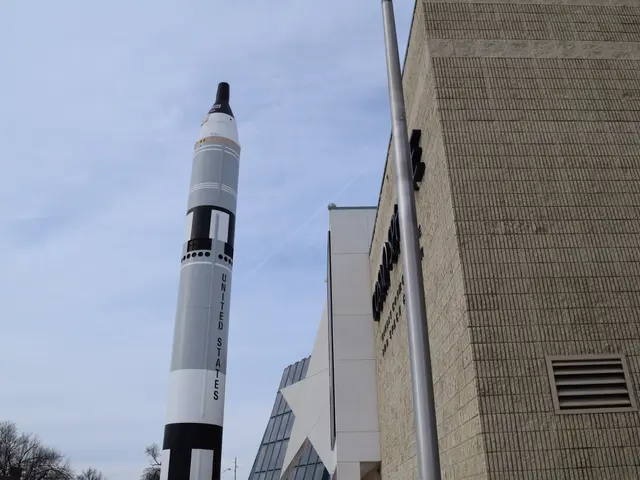U.S. Aid Stored by Israel Amid Conflict Zones
In the Gaza Strip, crowds surged towards a remote parking lot on Tuesday, prompting scuffles and shots being fired as thousands clamored for food aid packages. The chaos unfolded during the initial distribution of food packages in the war-torn region in over three months.
The unfolding scenes of disarray marked the beginning of the aid distribution under the newly established Gaza Humanitarian Foundation (GHF), a US-based foundation, following Israel's military's temporary takeover of humanitarian aid tasks.
Initially, the military had announced that aid packages would be distributed at two locations. However, the only confirmed location was a fenced-off parking lot in Rafah, the southernmost part of the Gaza Strip. Eyewitnesses recounted the tense atmosphere and the overwhelmed crowd, with some running empty-handed, while others managed to secure packages marked with the GHF logo.
An Israeli military spokesman later explained that soldiers fired warning shots outside the grounds, but no injuries were reported. The GHF maintained that their team withdrew due to the high demand on site and to enable a small number of civilians to disperse. Despite the chaotic start, the foundation claims to have successfully distributed 8,000 packages on the first day.
The plan to privatize aid distribution in the Gaza Strip was initiated by a group of Israeli-American businessmen, who aimed to reduce Israel's reliance on UN organizations that they perceived as pro-Hamas benefactors. The funding for the privatization effort came from Michael Eisenberg, a Jewish US investor, whose funds originate from a Western European country.
The GHF appointed former CIA officer Philip F. Reilly as the project leader, who founded both the GHF and a private security company, Safe Reach Solutions (SRS). The foundation's previous CEO, Jake Wood, recently resigned due to concerns about adhering to humanitarian principles while working under military influence. The distribution of aid continued under Reilly's leadership.
Established in November 2021, the GHF is composed of humanitarian, government, and military officials aiming to provide humanitarian assistance in the Gaza Strip, which has been beset by conflict for years, leaving millions of civilians without access to essential resources like food. However, the GHF's approach to aid distribution— employing private security firms to guard distribution centers—has raised concerns about the potential politicization and weaponization of aid.
Some critics argue that the GHF's operations violate international humanitarian principles by involving military personnel in aid delivery, while others contend that the foundation's approach undermines established aid distribution networks. Amnesty International has labeled the GHF's operations as illegitimate and inhumane, citing violations of humanitarian principles such as impartiality and neutrality.
- Other international organizations and news outlets, such as general-news platforms and mixed-martial-arts magazines, have reported on the controversial aid distribution by the Gaza Humanitarian Foundation (GHF), highlighting concerns about potential politicization and weaponization of aid.
- The GHF's decision to employ private security firms like Safe Reach Solutions (SRS) to guard distribution centers has sparked discussions about war-and-conflicts and political implications in the aid delivery process, with critics calling it a deviation from established aid distribution networks.
- While the GHF claims to have successfully distributed 8,000 aid packages on the first day, the chaotic start and ensuing controversy have led to a mixed response, with some praising the swift action and others questioning the intervention's political motivations and adherence to humanitarian principles.








